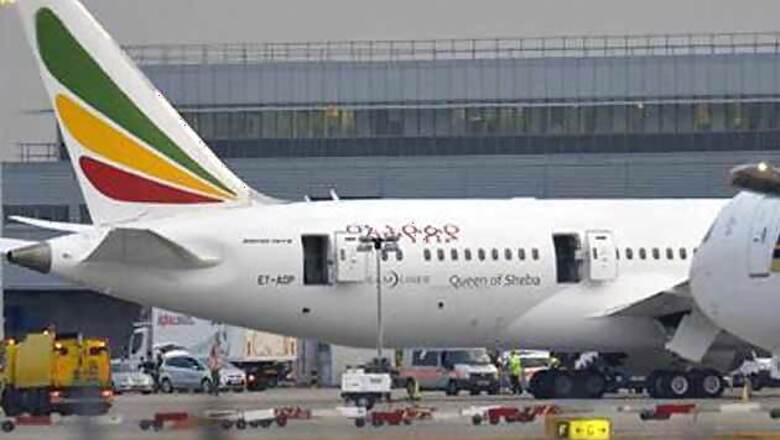
views
Investigators have found no evidence of a link between a fire that broke out on a Boeing 787 Dreamliner parked at London's Heathrow airport and the plane's batteries, Britain's Air Accidents Investigation Branch (AAIB) said on Saturday.
The question of whether the fire was connected to the batteries is crucial because the entire global fleet of Dreamliners, Boeing's groundbreaking new flagship jet, was grounded for three months this year due to battery-related problems.
The fire broke out on the Ethiopian Airlines plane on Friday afternoon, when it was parked at a remote stand with no passengers on board, eight hours after arriving from Addis Ababa. No one was injured.
"There has been extensive heat damage in the upper portion of the rear fuselage, a complex part of the aircraft, and the initial investigation is likely to take several days," the AAIB said in a statement.
"However, it is clear that this heat damage is remote from the area in which the aircraft main and APU (Auxiliary Power Unit) batteries are located, and, at this stage, there is no evidence of a direct causal relationship."
Separately, Britain's Thomson Airways said one of its Dreamliners that turned back during a flight from Manchester to Sanford in Florida on Friday had suffered a "minor technical issue" and had now had a small number of components replaced.
Thomson said the aircraft had been fully tested and was being taken back into service at once. The airline declined to specify which components had been replaced.
Thomson Airways, owned by the world's largest tour operator TUI Travel, has a total of three Dreamliners and all are now operating normally, the airline said.
Britain's Sky News television channel said it had learnt that some 100 Thomson passengers had called the airline's cancellation line asking to know if they were booked to fly on a Dreamliner. Sky News did not give a source for the information and Thomson declined to comment.
The Heathrow and Manchester incidents were a new blow for Boeing after the entire global fleet of Dreamliners had to be grounded for three months, ending in April, after one high-tech battery caught fire and another overheated.
Boeing shares closed down 4.7 per cent at $101.87 on Friday, knocking $3.8 billion off the company's market capitalisation.
Several airlines said they were continuing to operate their Dreamliners, including United Continental, the Polish airline LOT, Japan Airlines and ANA, the world's biggest operator of the 787.
Heathrow briefly closed both its runways to deal with Friday's fire, causing delays and cancellations, but was back to normal operations on Saturday.
Footage from the scene of the fire showed apparent scorching on the fuselage near the tail. The Dreamliner's two batteries are in compartments located low down near the front and middle of the plane.
The Ethiopian Airlines Dreamliner has been moved to a hangar at Heathrow where it is under technical investigation, the AAIB said, adding that the initial witness and physical evidence showed there had been smoke throughout the fuselage.
The AAIB said the US National Transportation Safety Board (NTSB), representing the state of design and manufacture, and the Civil Aviation Authority of Ethiopia, representing the state of registry and operator, had been invited to appoint accredited representatives to participate in the investigation.
The AAIB also said it had also invited the US Federal Aviation Administration, Boeing, Ethiopian Airlines, the European Aviation Safety Agency and Britain's Civil Aviation Authority to participate as advisers to the investigation.
Boeing will be keen to reassure airlines, travellers and investors over the cause of the fire as quickly as possible but under aviation rules it will be up to investigators to decide how much information to release and when.
Ethiopian Airlines, one of Africa's top five carriers, said it would continue to fly its Dreamliner fleet. It has ordered a total of 10 Dreamliners, of which four have been delivered.
"After a normal flight from Addis to London, passengers disembarked in the morning and the aircraft was cleaned. It was towed to a remote parking area as usual and parked properly with all internal and external powers switched off," said an official from the airline's public relations department.
Quoting Mark Mangooni, Ethiopian Airlines' senior manager in Britain, the Financial Times reported that airline staff had discovered a problem with the aircraft's air conditioning system during a routine inspection and had seen sparks but no flames.
The report did not make clear when this had happened. Reuters could not reach Mangooni for comment.




















Comments
0 comment